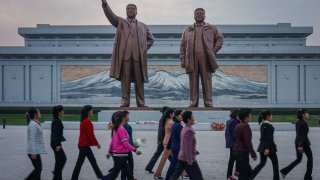Institutionalizing the Axis of Upheaval: The Russia-DPRK Strategic Partnership
Russia and North Korea’s security pact increases the difficulty of strategic prioritization in Asia.
Russia and North Korea have formalized a strategic partnership pledging mutual military support, reflecting their shared opposition to the current global order. The mutual economic and military benefits they stand to gain amid isolation, along with the potential for greater involvement from China despite its current concerns, call for a more coordinated international response to these interconnected threats.
On June 19, Russian President Vladimir Putin, during a summit meeting with the Democratic People’s Republic of North Korea (DPRK) leader Kim Jong-un, institutionalized the relationship between their respective countries through the Treaty on Comprehensive Strategic Partnership. Reminiscent of the 1961 Treaty of Friendship, Cooperation, and Mutual Assistance between the then-Soviet Union and North Korea.
The treaty stipulates that if either country faces a direct threat of armed invasion or is attacked by another state, the other will “provide military and other assistance with all means in its possession without delay...” The countries’ shared opposition to the present order and their determination to bring about change paved the way for this collaboration.
Russia’s treaty with the DPRK will not degrade Russia’s international legitimacy; it simply plays into and strengthens the narrative of a “coalition of the willing,” an “axis of upheaval,” that is concentrating efforts and aligning interests to bring about a supposedly new, fair, and equal international order.
This perception will only worsen as both Russia and the DPRK will aid each other through direct and indirect means of avoiding unilateral and multilateral sanctions. From a long-term perspective, Russia’s move is part of a greater strategic design to secure alternative sources of political and economic support after the isolation and loss of legitimacy after the international community’s retaliation in response to the invasion of Ukraine. The DPRK has much more to offer beyond the shipment of weapons and ammunition to fuel Russia’s war in Ukraine.
Russia has secured access to cheap labor and, possibly, depending on the nature of the commercial collaboration and the DPRK’s demands, significant reserves of natural resources, including iron, lithium, coal, and uranium. The treaty enshrines the possibility of military-technical cooperation aimed at “strengthening the defense capabilities” of both countries. This sort of collaboration could range from further and more frequent and institutionalized joint drills, from the exchange of more advanced weapons systems blueprints to Pyongyang to even making the DPRK a site for advanced weaponry production.
Additionally, cross-border commercial cooperation could result in greater economic returns for both the DPRK and Russia while also granting both countries better strategic access to the Sea of Japan for both commercial and military purposes, such as with the Tumen River development project.
China may view the DPRK’s deepening ties with Russia with concern, fearing that a more assertive Kim Jong-un will heighten tensions in Northeast Asia and lead to a larger U.S. regional military presence. However, a more stable and mutually beneficial relationship between Moscow and Pyongyang would not only directly benefit China by possibly granting it similar access to resources and geographic entry points but also help divert international and bilateral scrutiny away from China’s focal issues, such as Cross-Strait tensions and Xinjiang.
Therefore, China is expected to maintain a relatively neutral stance toward the Russia-DPRK relationship as long as the previously described scenario does not materialize. In the long term, China may enhance its bilateral cooperation with both North Korea and Russia, potentially deepening trilateral security ties.
Currently, the U.S. and the majority of world powers place China as a higher priority, either from the perspective of commerce, national security, or both, than the DPRK or even Russia. However, the United States and its allies should address this strengthening coalition that aims for a new global order and provokes coordinated crises across regions in a coordinated manner without treating them separately or in a rigidly hierarchical way.
Riccardo Villa is the Project Coordinator and Junior Research Fellow at ISDP’s Asia Program and Korea Center and also serves as Director of Security Affairs at The New Global Order, a Rome-based think tank. He is also a Kelly A. Korea Fellow at the Pacific Forum, conducting research on nuclear non-proliferation, military advancements, and innovation on the Korean Peninsula. His research primarily addresses inter-Korean relations and Northeast Asia's security dynamics, specializing in arms control and mediation.
Image: Jasmine Leung / Shutterstock.com.

